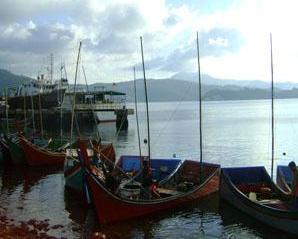Ahmad Mukminin
Goal of this project is developing ecosystem approach to fisheries management for sustainable fisheries that consists of human well being, ecosystem well being and ability to achieve in Weh Island.

Fishing operation at Weh Island.
Conventional fisheries management approaches aim to maximize the economic yield of a fishery often with little consideration of the ecological impacts 1995 the FAO published "Code of Conduct for Responsible Fisheries” (CCRF) which has led to a fundamental change in the fisheries management paradigm. One of new approaches includes whole ecosystem management. The FAO has mandated that every country in the world should use this approach.

Fishing boat.
Advantages of the ecosystems approach include the fact that relationships among species are considered, and that the sustainability of yields in emphasized rather than economic exploitation. In addition, an ecosystems approach also includes the establishment of marine protected areas as refuges from fishing in order to better promote continuity of natural resources.
The 2004 Sumatra-Andaman tsunami severely effected the coastal zone, causing widespread habitat loss in Aceh. In addition, the tsunami destroyed much infrastructure, in including fishing fleets, and governments are now planning how to rebuild these fisheries. This presents an important opportunity to develop new approaches to management of fisheries (Ecosystem Approach to Fisheries Management (EAFM) in the Province, but also at a more local scale, such as in Weh Island.
Objective of this project are:
1. Determine vision of fisheries management in Weh Island that has ecosystem approach
2. Formulating fisheries management approach indicators; Maximum Sustainable Yield, number of optimum appropriate fishing gear with ecosystem approach, fisheries institutional and management plan concept.
3. Increase community and local government capacity in adopting and implementing ecosystem approach to fisheries in Weh Island
4. Develop learning document from all of process as tools in developing ecosystem approach to fisheries management.
This project consists of two phases, these are initial phase and field work phase. Outcome of this project is learning document. Learning document will developed as a tool in developing ecosystem approach to fisheries management. Learning document is document that consists of:
1. Introduction and need of ecosystem approach to fisheries management (EAFM) in Indonesia
2. Management option and indicators management of EAF
3. Research need in developing EAF
4. Survey and monitoring protocol in EAF
5. Learning process in developing EAFM in Weh Island.
This document will be used by community and local government in implementing and evaluate EAF implementation in Weh Island. This document could be used by other local government in Indonesia to develop EAF for manage their fisheries resources.